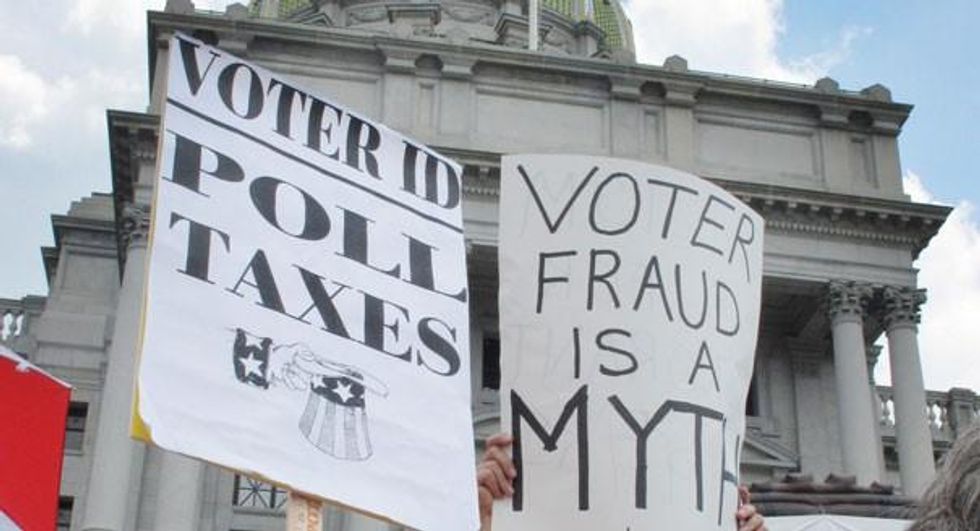

SUBSCRIBE TO OUR FREE NEWSLETTER
Daily news & progressive opinion—funded by the people, not the corporations—delivered straight to your inbox.
5
#000000
#FFFFFF
To donate by check, phone, or other method, see our More Ways to Give page.


Daily news & progressive opinion—funded by the people, not the corporations—delivered straight to your inbox.
The Supreme Court has struck down a controversial Voter ID law in Arizona, an action the ACLU has declared as a "victory."


NBC News reports that civil rights groups see the proposition as an effort to deter legal immigrants from voting. Groups also note that the law would require people to register in person instead of by mail, limiting people's access. Those in favor of the law maintain that it reduces voter fraud.
Brennan Center for Justice Democracy Program Director Wendy Weiser commented in a press release:
Voters scored a huge victory today. We applaud the Supreme Court for confirming Congress's power to protect the right to vote in federal elections. Congress recognized that voter registration must be made more accessible when it passed the National Voter Registration Act, and the Court also affirmed that today.
Weiser concluded her statement by emphasizing all the work that remains to be done to eliminate voting barriers, expressing concern about a potential challenge by the Supreme Court to the Voting Rights Act.
The decision in Arizona v. Inter Tribal Council is one of many highly anticipated rulings to be issued this week.
Lucia Brown is a summer editorial intern at Common Dreams.
_____________________
Dear Common Dreams reader, The U.S. is on a fast track to authoritarianism like nothing I've ever seen. Meanwhile, corporate news outlets are utterly capitulating to Trump, twisting their coverage to avoid drawing his ire while lining up to stuff cash in his pockets. That's why I believe that Common Dreams is doing the best and most consequential reporting that we've ever done. Our small but mighty team is a progressive reporting powerhouse, covering the news every day that the corporate media never will. Our mission has always been simple: To inform. To inspire. And to ignite change for the common good. Now here's the key piece that I want all our readers to understand: None of this would be possible without your financial support. That's not just some fundraising cliche. It's the absolute and literal truth. We don't accept corporate advertising and never will. We don't have a paywall because we don't think people should be blocked from critical news based on their ability to pay. Everything we do is funded by the donations of readers like you. Will you donate now to help power the nonprofit, independent reporting of Common Dreams? Thank you for being a vital member of our community. Together, we can keep independent journalism alive when it’s needed most. - Craig Brown, Co-founder |


NBC News reports that civil rights groups see the proposition as an effort to deter legal immigrants from voting. Groups also note that the law would require people to register in person instead of by mail, limiting people's access. Those in favor of the law maintain that it reduces voter fraud.
Brennan Center for Justice Democracy Program Director Wendy Weiser commented in a press release:
Voters scored a huge victory today. We applaud the Supreme Court for confirming Congress's power to protect the right to vote in federal elections. Congress recognized that voter registration must be made more accessible when it passed the National Voter Registration Act, and the Court also affirmed that today.
Weiser concluded her statement by emphasizing all the work that remains to be done to eliminate voting barriers, expressing concern about a potential challenge by the Supreme Court to the Voting Rights Act.
The decision in Arizona v. Inter Tribal Council is one of many highly anticipated rulings to be issued this week.
Lucia Brown is a summer editorial intern at Common Dreams.
_____________________


NBC News reports that civil rights groups see the proposition as an effort to deter legal immigrants from voting. Groups also note that the law would require people to register in person instead of by mail, limiting people's access. Those in favor of the law maintain that it reduces voter fraud.
Brennan Center for Justice Democracy Program Director Wendy Weiser commented in a press release:
Voters scored a huge victory today. We applaud the Supreme Court for confirming Congress's power to protect the right to vote in federal elections. Congress recognized that voter registration must be made more accessible when it passed the National Voter Registration Act, and the Court also affirmed that today.
Weiser concluded her statement by emphasizing all the work that remains to be done to eliminate voting barriers, expressing concern about a potential challenge by the Supreme Court to the Voting Rights Act.
The decision in Arizona v. Inter Tribal Council is one of many highly anticipated rulings to be issued this week.
Lucia Brown is a summer editorial intern at Common Dreams.
_____________________